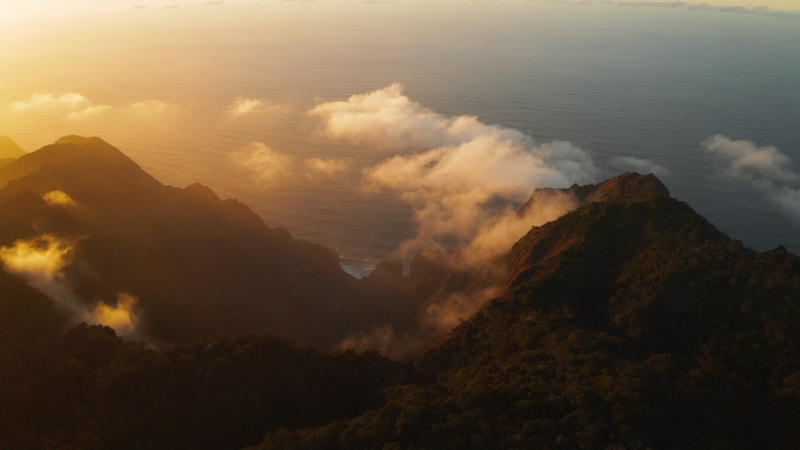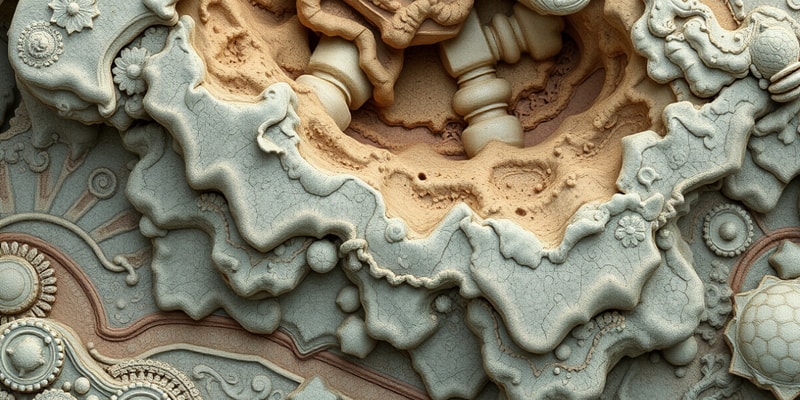Podcast
Questions and Answers
What term is used to describe the transported material resulting from erosion?
What term is used to describe the transported material resulting from erosion?
Which type of erosion is characterized by the formation of steep-sided valleys due to water flow?
Which type of erosion is characterized by the formation of steep-sided valleys due to water flow?
In which form does ice primarily contribute to the erosion process?
In which form does ice primarily contribute to the erosion process?
What is the term used to describe the movement of rock and soil down a slope due to gravity?
What is the term used to describe the movement of rock and soil down a slope due to gravity?
Signup and view all the answers
How does wind contribute to erosion, particularly in dry areas?
How does wind contribute to erosion, particularly in dry areas?
Signup and view all the answers
What is the primary process involved in mechanical weathering?
What is the primary process involved in mechanical weathering?
Signup and view all the answers
Which condition allows freeze-thaw weathering to effectively occur?
Which condition allows freeze-thaw weathering to effectively occur?
Signup and view all the answers
What mechanism primarily drives salt wedging in rocks?
What mechanism primarily drives salt wedging in rocks?
Signup and view all the answers
Which type of weathering includes the physical penetration of roots in the soil?
Which type of weathering includes the physical penetration of roots in the soil?
Signup and view all the answers
What characterizes chemical weathering?
What characterizes chemical weathering?
Signup and view all the answers
Which process describes the action of salt crystals pushing rock grains apart?
Which process describes the action of salt crystals pushing rock grains apart?
Signup and view all the answers
What is bioturbation in the context of organic weathering?
What is bioturbation in the context of organic weathering?
Signup and view all the answers
Which of the following processes is NOT a type of weathering?
Which of the following processes is NOT a type of weathering?
Signup and view all the answers
What is the primary process of weathering?
What is the primary process of weathering?
Signup and view all the answers
Which factor does NOT influence the rate of weathering?
Which factor does NOT influence the rate of weathering?
Signup and view all the answers
What distinguishes chemical weathering from mechanical weathering?
What distinguishes chemical weathering from mechanical weathering?
Signup and view all the answers
Which of the following is NOT an agent of weathering?
Which of the following is NOT an agent of weathering?
Signup and view all the answers
What happens to rocks during mechanical weathering?
What happens to rocks during mechanical weathering?
Signup and view all the answers
Which situation is most likely to enhance weathering?
Which situation is most likely to enhance weathering?
Signup and view all the answers
In which type of weathering do rocks undergo physical disintegration?
In which type of weathering do rocks undergo physical disintegration?
Signup and view all the answers
Which of the following best describes mass wasting?
Which of the following best describes mass wasting?
Signup and view all the answers
What is the primary agent of erosion on Earth?
What is the primary agent of erosion on Earth?
Signup and view all the answers
What occurs during the process of carbonation?
What occurs during the process of carbonation?
Signup and view all the answers
Which of the following best describes hydrolysis?
Which of the following best describes hydrolysis?
Signup and view all the answers
Which type of erosion is primarily caused by the force of gravity?
Which type of erosion is primarily caused by the force of gravity?
Signup and view all the answers
Which chemical process works on rocks containing iron?
Which chemical process works on rocks containing iron?
Signup and view all the answers
How does rust contribute to the weathering of rocks?
How does rust contribute to the weathering of rocks?
Signup and view all the answers
Which of the following is not a type of erosion?
Which of the following is not a type of erosion?
Signup and view all the answers
What indicates that erosion is taking place in a fluid?
What indicates that erosion is taking place in a fluid?
Signup and view all the answers
What is the primary characteristic of creep in mass wasting?
What is the primary characteristic of creep in mass wasting?
Signup and view all the answers
Which type of mass wasting involves the sliding of materials along a curved surface?
Which type of mass wasting involves the sliding of materials along a curved surface?
Signup and view all the answers
What causes landslides to occur?
What causes landslides to occur?
Signup and view all the answers
What is the defining feature of rockfall in the context of mass wasting?
What is the defining feature of rockfall in the context of mass wasting?
Signup and view all the answers
Which type of mass wasting poses a significant hazard during construction due to its potential for causing damage?
Which type of mass wasting poses a significant hazard during construction due to its potential for causing damage?
Signup and view all the answers
Which of the following is NOT a cause of landslides?
Which of the following is NOT a cause of landslides?
Signup and view all the answers
What type of mass wasting is primarily characterized by the movement of water-saturated debris?
What type of mass wasting is primarily characterized by the movement of water-saturated debris?
Signup and view all the answers
Why is it important to consider creep when evaluating land for real estate?
Why is it important to consider creep when evaluating land for real estate?
Signup and view all the answers
Study Notes
Weathering
- Weathering involves the breakdown or dissolution of rocks and minerals through physical or chemical processes.
- Agents of weathering include water, ice, acids, salts, temperature variations, plants, and animals.
- Physical weathering leads to the disintegration of rocks into smaller pieces without altering their chemical composition.
- Chemical weathering transforms minerals in rocks, creating new substances through reactions.
- Key factors influencing weathering include climate, time, mineral composition of parent rock, number of fissures, and slope degree.
Types of Weathering
- Mechanical weathering breaks rocks into smaller fragments without chemical change; the resulting material is called sediment.
- Organic weathering, or bioweathering, is caused by living organisms (e.g., root growth, animal burrowing) that break down rocks.
- Chemical weathering, or decomposition, results from chemical reactions that wear away rocks, including three main types:
- Carbonation: CO2 interacts with water and minerals, forming acids that weaken rock.
- Hydrolysis: Chemical changes occur when minerals react with water, creating new solutions.
- Oxidation: Oxygen reacts with ions (e.g., iron) in rock, resulting in rust and weakening the rock structure.
Erosion
- Erosion is the geological process where earthen materials are worn away and transported by natural forces like wind and water.
- Four main types of erosion: water, wind, ice, and gravity erosion.
- Water erosion is the dominant type, occurring through rain, rivers, floods, lakes, and oceans.
Types of Erosion
- Water Erosion: Can carry soil and sand, visible in muddy conditions where sediment is suspended in water.
- Wind Erosion: Often moves dust, sand, and ash, causing the formation of dunes and smoothing rocks through mechanical action.
- Ice Erosion: Glaciers slowly erode land, transporting a range of materials and forming distinct landforms, with moraines as evidence of eroded sediment.
- Gravity Erosion (Mass Movement): The movement of soil or rock down slopes due to gravity, contributing to landslides and other slope failures.
Mass Wasting
- Mass wasting refers to the downslope movement of rock and soil due to gravity.
- Six types of mass wasting include:
- Creep: Slow, imperceptible movement of soil/rock, often indicated by curved trees.
- Slump: The downward sliding of rock material along a curved surface, less dangerous but can damage structures.
- Landslide: Rapid movement of rock, earth, or debris from unstable slopes, influenced by water, seismic activity, and human actions.
- Rockfall: Rapid detachment and downward movement of rock from cliffs or road cuts, often triggered by weathering.
- Debris Flow: A mixture of water, rock, and soil flows rapidly down a slope, usually after heavy rain.
- Avalanche: A rapid flow of snow and ice down a slope, often triggered by disturbances.
Important Concepts
- Gravity significantly impacts erosion and mass wasting both directly and indirectly through its influence on water and the stability of slopes.
- Each erosion type plays a critical role in shaping landscapes and forming landforms over time.
Studying That Suits You
Use AI to generate personalized quizzes and flashcards to suit your learning preferences.
Description
This quiz covers key concepts in GEOL 100 focusing on weathering, erosion, and mass wasting. Students will explore definitions, types, and factors that affect landforms through these geological processes. Prepare to test your understanding of how these processes shape our environment.




